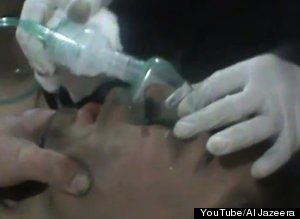 BEIRUT, Dec 24 (Reuters) - Syria special envoy Lakhdar Brahimi discussed solving the country's conflict with President Bashar al-Assad on Monday, but the opposition expressed deepening frustration with the mission following what it called the latest massacre of civilians.
BEIRUT, Dec 24 (Reuters) - Syria special envoy Lakhdar Brahimi discussed solving the country's conflict with President Bashar al-Assad on Monday, but the opposition expressed deepening frustration with the mission following what it called the latest massacre of civilians.Underlining how rebels are taking the battle close to Assad's doorstep, the U.N. and Arab League envoy had to drive to Damascus from Lebanon on the eve of the meeting as fighting around the international airport made it impossible to fly in.
Brahimi said his talks with Assad had dealt with possible solutions to a crisis that has killed more than 44,000 people, according to activists.
"I told him what I was seeing abroad and about the meetings I had with different officials in the region and abroad," Brahimi told reporters. "The situation in Syria still is a reason for worry. We hope that all the sides work toward the solution, as the Syrian people want."
Monday's meeting was Brahimi's third with Assad and violence has greatly escalated since the series began.
Syria's opposition vented its anger at what it called a silence over the unabated killing of civilians by Assad's forces. On Sunday, dozens of people were killed in the central town of Halfaya and many more wounded. Activists blamed an air strike that hit a bakery where a crowd was queuing in Halfaya, which was seized by rebels last week.
"Silence over the massacres committed against the Syrian people is blackmail and a means to pressure the people, their revolution, and their leaders," said Moaz Alkhatib, who heads the opposition National Coalition.
"The Halfaya massacre is not just a massacre but a message from both those who are part of the regime and those who support it, and in short it is: Either you die or you accept the enslavement that we will force upon you," he wrote on his Facebook page.
However, Alkhatib did not accuse anybody directly for remaining silent over what would be one of the deadliest air strikes of the civil war.
Activists also said rebels in central Hama province shot down a government fighter jet on Monday, in clashes outside a village loyal to Assad.
Rebels have captured several military sites around the country. Damascus is now being dragged into the unrest, with fighting in its southern districts and the suburbs on its eastern outskirts.
The army has hit back at rebel-held areas near Damascus with daily air raids and artillery strikes that have sent thousands fleeing to the city centre and over the border to Lebanon.
Brahimi is the successor of envoy Kofi Annan, who resigned in August after a failed ceasefire attempt and blamed both rising militarisation in Syria and diplomatic deadlock abroad.
Little seems to have changed since then. Brahimi's own ceasefire efforts in October failed after four days.
Western powers such as the United States, which back the opposition, continue to call for Assad's removal. Syria's main arms supplier Russia has given mixed signals. Most recently the foreign minister of Russia, which along with China has blocked U.N. resolutions against Assad, said the president "is not going anywhere".
Brahimi's plan for an end to the Syrian crisis centres on a transitional government, but has left vague Assad's role. The opposition rejects anything but Assad's overthrow and says the government crackdown has been too fierce to accept dialogue.
POISON GAS REPORTS
With rebel gains growing, the army has been increasingly relying on its superior weaponry. It has used air strikes and even long range, scud-type missiles, according to U.S. and NATO reports.
Western powers have warned Assad that using chemical weapons would be a "red line", which they implied would draw international involvement in the conflict.
Syria repeated on Sunday that it would never use chemical weapons, but activists released reports later that day of what they said was a poison gas attack in the city of Homs.
The reports are difficult to confirm, as the government restricts media access in Syria.
The Syrian Observatory for Human Rights gathered activist accounts of the incident, which said that six rebel fighters were killed after inhaling smoke on the front line of Homs's urban battleground.
"White smoke without a smell spread throughout the area after regime forces threw grenades that emitted white smoke when they hit a wall," the Observatory said. "Those who inhaled the gas said they felt dizzy and suffered headaches and some suffered seizures."
The Observatory, a British-based group with a network of activists across the country, called on the International Committee of the Red Cross to send a medical team to the area to determine what had happened.
A previous report of poison gas was determined to be false by some military experts, but none has commented on the reported Homs attack.
Original Article
Source: huffington post
Author: Erika Solomon
No comments:
Post a Comment